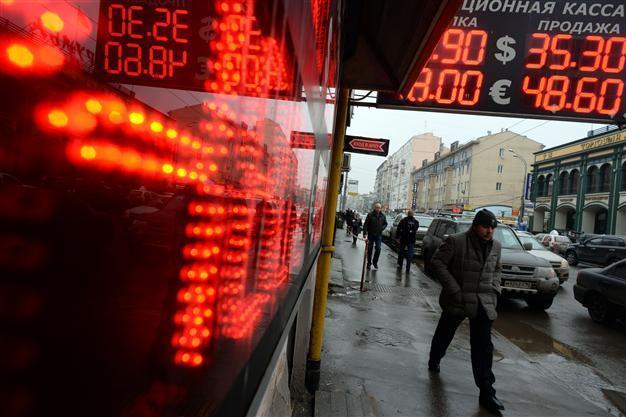Russian central bank hikes rates as ruble plunges over Ukraine crisis
MOSCOW - Agence France-Presse

Moscow's MICEX bourse fell 5.89 percent in early trading on March 3. AFP photo
Russia's central bank on March 3 hiked its main interest rate in an emergency move to limit the economic damage from Russian military intervention in Ukraine, as stocks plunged and the ruble hit historic lows against the dollar and the euro.The Bank Rossii (Bank of Russia) raised its main interest rate to 7.0 percent from 5.50 percent in a clear bid to support the ruble and stem an already alarming capital flight amid the tensions between Russia and Ukraine.
"The decision is aimed at averting the appearance of risks for inflation and financial stability linked to the increased volatility on financial markets," it said in a statement, adding the hike would take effect from March 3.
Both Russia's main stock markets had earlier opened sharply lower and the ruble hit historic lows against the dollar and the euro in a widely expected reaction to Russia's plan for military intervention in Ukraine over the situation in Crimea.
President Vladimir Putin on March 2 won approval from Russia's upper house for the sending of Russian troops to Ukraine, amid the standoff in Crimea following the ousting of pro-Moscow president Viktor Yanukovych.
But Ukrainian officials say there are already thousands of Russian troops in Crimea and Western states have threatened to throw Russia out of the G8 group of top nations over the crisis.
The MICEX stock market in Moscow was trading down 7.81 percent while the RTS bourse had fallen by 9.05 percent at around 0715 GMT.
Stocks in Russian gas giant Gazprom - which has a huge contract to export gas to Ukraine as well as banking interests in the country - fell over 10 percent.
Stocks in the hugely volatile steelmaker Mechel meanwhile fell 26 percent, forcing a suspension of trading in the stocks.
The ruble has already been under major pressure in recent weeks due to investor nerves about emerging markets and Russia's flimsy medium term growth prospects.
But on March 3 it lost further value to trade at more than 50 rubles to the euro, with 51.20 rubles buying one euro.
It was a similar story with ruble/dollar trade, with one dollar worth just over 37 rubles, the lowest value ever for the Russian currency and beating even the financial crisis of 2009.
The economic consequences of intervention in Ukraine risk becoming a huge headache for Putin and have parallels with the 2008 war with Georgia over the region of South Ossetia, which led to Russia's 2009 financial crisis.
Even before the crisis in Ukraine, Russia's economy was facing trouble with growth of just 1.3 percent in 2013 and its performance now directly impacted by the government's failure to end the country's dependence on oil and gas exports.
But the Ukraine crisis risks drastically worsening the situation as foreign investors pull out of Russia for both economic and political reasons and Russian companies themselves suffer due to the Ukraine turmoil.
















